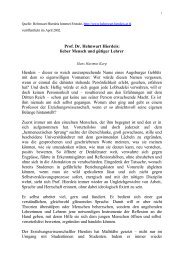Download pdf - Universität Innsbruck
Download pdf - Universität Innsbruck
Download pdf - Universität Innsbruck
Erfolgreiche ePaper selbst erstellen
Machen Sie aus Ihren PDF Publikationen ein blätterbares Flipbook mit unserer einzigartigen Google optimierten e-Paper Software.
Privacy on Social Networking Sites within a Culture of Exchange 97<br />
based on the targeted advertising business model, which means that it engages in exchange<br />
contracts with the advertising industry. It sells data, which is produced while people use<br />
the site for different reasons, such as getting news, providing information, staying in touch<br />
with friends, making new relations, or organising events, to advertisers. Facebook’s business<br />
model is based on secondary use of this data for commodification and valorisation<br />
purposes (see Dallas Smythe, 1989; Fuchs, 2011a). Whereas traditional forms of advertising<br />
are directed to broad groups of potential buyers, targeted advertising is tailored for<br />
exactly defined and differentiated groups, or even single consumers. This demands more<br />
detailed, exact, and differentiated knowledge of the users’ needs and (buying) behaviour.<br />
The economic reason why profit-oriented SNS develop massive systems of surveillance<br />
and store “literally everything”, as a Facebook employee admitted (see Wong, 2010), lies<br />
therein. Users’ interests in privacy can only be considered when the need for privacy does<br />
not inhibit profit interests.<br />
One can conclude that SNS’s surveillance based business model, which has its reason in<br />
the profit-orientation, can cause a privacy crisis. Facebook changes its terms of use and<br />
privacy policy steadily, thereby ever more personal data becomes available publicly to<br />
ever more people by its default privacy settings (see McKeon, 2010). These processes<br />
have resulted in public outcry. An example of such outcry are several complaints against<br />
Facebook, like the complaints by the Electronic Privacy Information Center (EPIC) addressed<br />
to the US Federal Trade Commission (see Epic et al., 2009; 2010), the complaints<br />
by Austrian students addressed to the Irish Data Protection Commissioner (see Europe<br />
versus Facebook 2011), or the investigation by the Nordic data inspection agencies (see<br />
Datatilsynet, 2011). Our political economy analysis of privacy on Facebook shows that<br />
evoking privacy crisis lies in the nature of profit-oriented SNS.<br />
It seems that privacy is the opponent term to surveillance. Surveillance, which takes place<br />
on SNS out of economic reasons, and privacy contradict each other. However, some lucid<br />
authors have made different observations. For instance, Nock says that “a society of<br />
strangers is one of immense personal privacy. Surveillance is the cost of that privacy”<br />
(Nock, 1993, p. 1). Lyon agrees that “in our nomadic world the society of strangers seeks<br />
privacy that actually gives rise to surveillance” (Lyon, 2005, p. 27). Some draw consequences<br />
from these observations and argue that referring to privacy cannot be the appropriate<br />
way to challenge surveillance (see Stalder, 2002). Critical dialectical theory reminds<br />
us that “the conception of the contradictory nature of societal reality does not, however,<br />
sabotage knowledge of it and expose it to the merely fortuitous. Such knowledge is guaranteed<br />
by the possibility of grasping the contradiction as necessary and thus extending<br />
rationality to it” (Adorno, 1976, p. 109). On behalf of our political economy analysis of<br />
the culture of exchange, we are able to do exactly what critical dialectical theory proposes.<br />
In figure 1, the nexus of privacy, private property, and surveillance within a culture of exchange<br />
is presented.
















